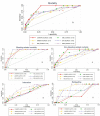Validating the CHAMPS Score: A Novel and Reliable Prognostic Score of Non-Variceal Upper Gastrointestinal Bleeding
- PMID: 39050121
- PMCID: PMC11268722
- DOI: 10.2147/CEG.S469218
Validating the CHAMPS Score: A Novel and Reliable Prognostic Score of Non-Variceal Upper Gastrointestinal Bleeding
Abstract
Introduction: The Charlson Comorbidity Index ≥2, in-Hospital onset, Albumin <2.5 g/dL, altered Mental status, Eastern Cooperative Oncology Group Performance status ≥2, Steroid use (CHAMPS) score is a novel and promising prognostic tool. We present an initial external validation of the CHAMPS score for predicting mortality in acute nonvariceal upper gastrointestinal bleeding (NVUGIB) across multiple clinical outcomes.
Methods: A prospective cohort study was conducted on adult patients with NVUGIB admitted to the Department of Gastroenterology between November 2022 and June 2023. The CHAMPS score performance in predicting in-hospital outcomes was evaluated by employing area under the receiver operating characteristic (AUROC) curves, followed by a comparative analysis with five pre-existing scores.
Results: A total of 140 patients were included in the study. The CHAMPS score showed its highest performance in predicting mortality rates (AUROC = 0.89), significantly outperforming the Glasgow-Blatchford Bleeding Score (GBS) as well as the Albumin level <3.0 mg/dL, International normalized ratio >1.5, altered Mental status, Systolic blood pressure ≤90 mmHg, and age >65 years (AIMS65) score (AUROC = 0.72 and 0.71, respectively; all p < 0.05). Subgroup analysis for bleeding-related and non-bleeding-related mortality further confirmed the robust predictive capability of the CHAMPS score (AUROC = 0.88 and 0.87, respectively). The CHAMPS score failed to predict rebleeding and intervention reliably, exhibiting AUROC values of 0.43 and 0.55, respectively. The optimal CHAMPS score cutoff value for predicting mortality was 3 points, achieving 100% sensitivity and 71.2% specificity. In the low-risk category defined by both CHAMPS and GBS scores, mortality and rebleeding rates were 0%. However, within the CHAMPS score-based low-risk group, 58.8% required intervention, contrasting with a 0% intervention rate for the GBS score-based low-risk group (GBS score ≤1).
Conclusion: The CHAMPS score consistently demonstrated a robust predictive performance for mortality (AUROC > 0.8), facilitating the identification of high-risk patients requiring aggressive treatment and low-risk patients in need of localized treatment or safe discharge after successful bleeding control.
Keywords: CHAMPS; GBS; mortality prediction; non-variceal upper gastrointestinal bleeding; risk scores.
© 2024 Lam et al.
Conflict of interest statement
All authors declare no conflicts of interest in this work.
Figures
Similar articles
-
CHAMPS score in predicting mortality of patients with acute nonvariceal upper gastrointestinal bleeding.Rev Assoc Med Bras (1992). 2023 Apr 14;69(4):e20221052. doi: 10.1590/1806-9282.20221052. eCollection 2023. Rev Assoc Med Bras (1992). 2023. PMID: 37075441 Free PMC article.
-
Comparison of various prognostic scores in variceal and non-variceal upper gastrointestinal bleeding: A prospective cohort study.Indian J Gastroenterol. 2019 Apr;38(2):158-166. doi: 10.1007/s12664-018-0928-8. Epub 2019 Mar 4. Indian J Gastroenterol. 2019. PMID: 30830583
-
AIMS65, Glasgow-Blatchford bleeding score and modified Glasgow-Blatchford bleeding score in predicting outcomes of upper gastrointestinal bleeding: An accuracy and calibration study.Indian J Gastroenterol. 2023 Aug;42(4):496-504. doi: 10.1007/s12664-023-01387-z. Epub 2023 Jun 29. Indian J Gastroenterol. 2023. PMID: 37382854
-
Pre-Endoscopic Scores Predicting Low-Risk Patients with Upper Gastrointestinal Bleeding: A Systematic Review and Meta-Analysis.J Clin Med. 2023 Aug 9;12(16):5194. doi: 10.3390/jcm12165194. J Clin Med. 2023. PMID: 37629235 Free PMC article. Review.
-
Comparison of Risk Scores for Lower Gastrointestinal Bleeding: A Systematic Review and Meta-analysis.JAMA Netw Open. 2022 May 2;5(5):e2214253. doi: 10.1001/jamanetworkopen.2022.14253. JAMA Netw Open. 2022. PMID: 35622365 Free PMC article.
References
LinkOut - more resources
Full Text Sources


